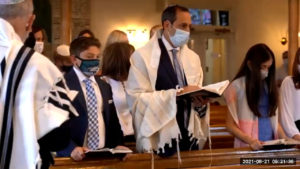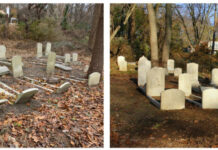Rabbi Eric Yanoff has been busy making calls to every congregant at Temple Adath Israel on the Main Line these past few weeks. He’s asking about their High Holidays and membership renewal plans.
Around this time of year, when some Jews make their annual two-time synagogue appearances for Rosh Hashanah and Yom Kippur, synagogues are trying their best to keep — and grow — membership numbers. COVID-19 has complicated the process.
Adath Israel is fortunate: Its membership numbers remained steady during the pandemic, largely because of continued — masked and distanced — in-person programming.
An outdoor Purim program brought in more than 275 people, and the shul held a Simchat Torah program and an end-of-Yom Kippur Havdalah outside last year, as well.

“We may not be able to do it exactly the way it was, but we want to bring people together; we want to make people feel a part of a community,” Yanoff said. “We really haven’t stopped doing that at all.”
Still, Yanoff is making the effort to connect with congregants who may not have had the same opportunities to attend in-person services and celebrations.
In addition to hosting a High Holiday packets pick-up, Adath Israel is delivering packets to its senior members.
Congregation Kesher Israel in Society Hill is making calls — house and phone — too. It is delivering prayer books as a way to reach out to members.
The efforts appear to be paying off. Last year, initially only 64% of congregants from two years ago renewed their membership, which increased to 82% after the High Holiday season. This year, Kesher Israel is beginning at more than 70% membership retention. Like Yanoff, Kesher Israel’s Executive Director Norman Millan is trying to instill a sense of ownership in the synagogue to push for membership numbers to increase.
“We really need your membership, and you’re part of our family,” Millan said.
Though the return of in-person services sweetened the pot for members’ return to the synagogue, Millan said that due to financial reasons, Kesher Israel’s Sisterhood was dismantled. A women’s study group was established in its place.
Like so many other groups, the study group that once met in person is now online and looks to remain that way, as it’s challenging to gather in-person for smaller, intimate group discussions.
According to one study group member, Beth-Ellen Kroope, the group has been helpful for those who may not attend Shabbat services.
“Sometimes, other people have gotten involved that weren’t involved before,” she said.
Congregation Leyv Ha-Ir in Center City is keeping its remote programming for similar issues.

Leyv Ha-Ir’s congregation doesn’t have a building but rents a space at Rittenhouse Square. In-person services weren’t in the picture this year, but that wasn’t a problem.
“We just felt our members have been so good about being engaged on Zoom,” Leyv Ha-Ir President Bobbi Cohen said. “We literally don’t have one person who was unable to get on.”
During the pandemic year, Leyv Ha-Ir’s membership actually increased. People from all over the country who had heard of the shul or its rabbis started attending programs over Zoom.
Mishkan Shalom also saw membership grow due to online programming attended by those outside of Philadelphia.
As a result, they’ll keep much of their programming online indefinitely.
“During the week, we have at least one, and up to four, offerings every day that emerged during COVID, and almost all of them are staying online,” Mishkan Shalom Rabbi Shawn Zevit said.
Zevit, along with these other synagogues, have been flexible with membership dues, especially sensitive to those who have been financially impacted by the pandemic.
Mishkan Shalom has ticketless High Holiday services and self-assessed dues, which have been in place for nine years. Leyv Ha-Ir has sliding membership dues ranging from $600-$1,000 for individuals and $900-$1,500 for families.
For Leyv Ha-Ir, which has seen donations slightly decrease even as membership has grown, the financial debate of being a member of a synagogue is apparent.
Regardless of the dues system, synagogues don’t want to turn anyone down. For Adath Israel and Kesher Israel members who can’t afford to pay full price, the synagogues will find accommodations. And many times, members who can afford to donate a little extra will do so.
Though synagogues are working hard to retain congregants and consistent funding, Zevit hopes to think of synagogue engagement differently. He said that though some members only come for High Holiday services or for certain programming, the connection is still there.
“We often play the numbers game: how many households, how many people at ‘x’ programs,” Zevit said. “But what if we thought about how many people’s lives have changed by virtue of being part of our community?”
[email protected]; 215-832-0741






